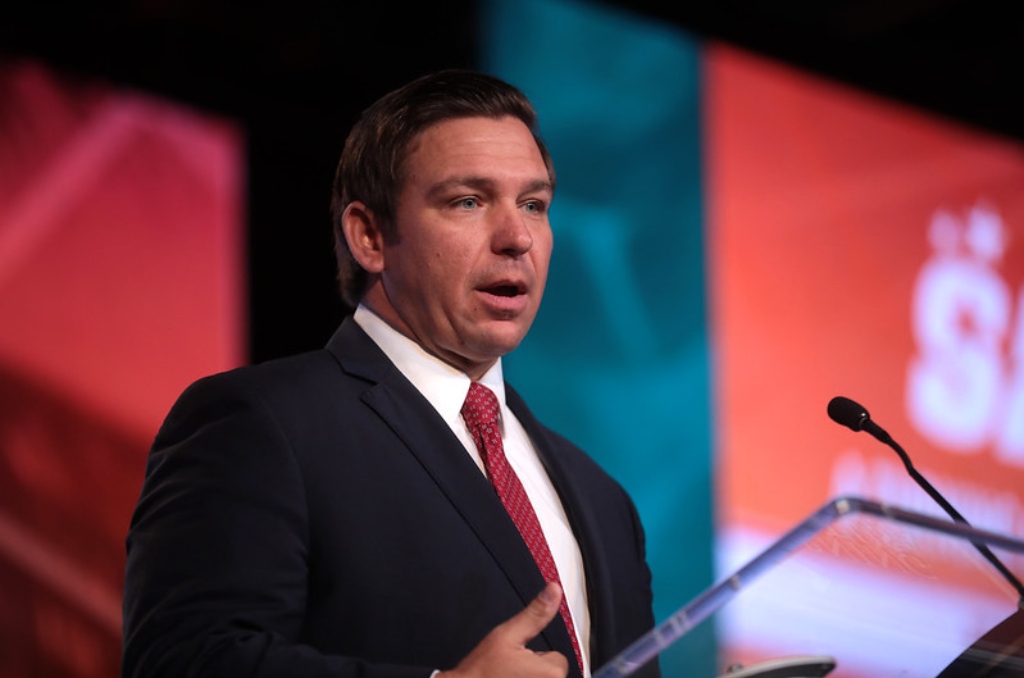Governor-elect Ron DeSantis speaking with attendees at the 2018 Student Action Summit hosted by Turning Point USA at the Palm Beach County Convention Center in West Palm Beach, Florida, USA. Photo and Caption: Gage Skidmore | Flickr
Florida governor Ron DeSantis has been busy. He made an announcement Thursday that the state will preempt local governments from imposing pandemic restrictions on restaurants and he will propose a bill of rights for college students to party. Yes, you heard right. He is fighting for student’s right to party.
DeSantis believes a “preemption” of local government authority can be enacted through the Florida Department of Business and Professional Regulation, which oversees licensing. The governor is ready to begin easing state restrictions that place a 50 percent indoor occupancy limit on restaurants and bars. Florida reported 2,541 more COVID-19 cases on September 25, bringing the statewide total to more than 693,000.
The state also reported 177 more deaths, bringing the total among Florida residents to at least 13,795.
Governor Ron DeSantis announced Friday morning that Florida is moving into full Phase 3 of its reopening. The order specifically lifts COVID-19 restrictions on restaurants. Restaurants can now operate at a minimum of 50% capacity, meaning they are fully open. Governor DeSantis says if local governments try to restrict the reopening of any restaurant, they need state’s approval.
Some residents are questioning when the mandatory mask mandate will end. Since the pandemic surfaced in Florida in March, DeSantis has openly questioned the need for statewide mandates for masks. But he shut down bars and nightclubs, as well as severely limited how restaurants can operate.
Phase 3 also states that bars, pubs and nightclubs that derive more than 50 percent of sales from alcohol should operate at full capacity with limited social distancing protocols. The pandemic prompted the governor to close bars and nightclubs, and restricted restaurants and non-essential air travel for months.
DeSantis added the Florida Department of Business and Professional Regulation (DBPR) will preempt local governments from imposing more strict regulations. “We license the restaurants, so it’s a DBPR thing,” DeSantis said. “We believe we would be able to ensure, based on our licensure ability, their ability to operate. They’re not going to be able to be closed by locals anymore, and they will be able to operate at the capacity they’re comfortable with.”
The governor said the state’s 41,000 eating and drinking establishments, which employ more than 1 million people and generated $50.1 billion in sales in 2018, “need certainty.”
Florida added 2,847 confirmed coronavirus cases on Friday, pushing the statewide total since March 1 to 695,887. The state also announced 120 new virus deaths, pushing its total to 14,038. Hospitalizations declined by 34 to 2,137 people. Under Phase 3, non-essential air trial may resume as well.
The Republican governor was quick to acknowledge that the pandemic is far from over yet. “We’re not closing anything going forward,” he told reporters, insisting that the state is prepared if infections climb once again. Florida has long been a COVID-19 hot spot, with almost 700,000 people infected by the virus since the pandemic gripped the nation in March.
According to data from the Florida Department of Health, nearly 14,000 Floridians have already died.

William is the Managing Editor at FloridaInsider.com. His years of experience in journalism, broadcasting and multimedia include roles as a Writer and Web Producer. He graduated from Florida International University with a Bachelor of Science and Communication.

